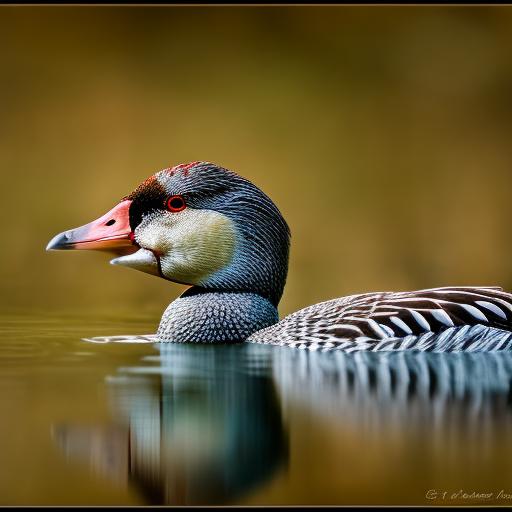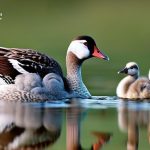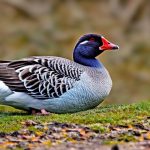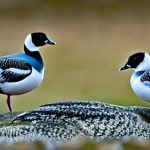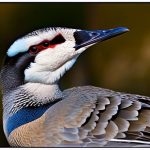Geese taking over ponds and parks has become a common problem in many areas. These birds can quickly multiply and create a nuisance for both humans and other wildlife. They leave behind droppings that can be unsightly and unsanitary, and they can also damage vegetation and property. Fortunately, there are several methods that can be used to control geese and prevent them from taking over these areas.
One of the most effective ways to control geese is by understanding their behavior and habits. By knowing what attracts geese to ponds and parks, we can implement strategies to deter them. Additionally, physical barriers, decoys, motion-activated sprinklers, natural barriers with plants and shrubs, sound deterrents, removing food sources, attracting natural predators, regular maintenance and cleaning of the pond, and seeking professional help are all methods that can be used to control geese.
Key Takeaways
- Geese are attracted to open water and grassy areas near ponds.
- Physical barriers like fences and netting can prevent geese from accessing the pond.
- Decoys like fake predators or other animals can deter geese from approaching.
- Motion-activated sprinklers can startle geese and discourage them from staying.
- Planting natural barriers like tall grasses and shrubs can make the area less attractive to geese.
Understanding the behavior of geese
Geese are social birds that typically live in large flocks. They are attracted to ponds and parks because these areas provide them with a reliable source of food, water, and shelter. Geese are herbivores and feed on grasses, aquatic plants, and grains. Ponds and parks often have an abundance of these food sources, making them an ideal habitat for geese.
Geese also prefer open areas with easy access to water. Ponds provide them with a safe place to rest and sleep, as they can easily escape into the water if they feel threatened. Additionally, geese are attracted to areas with short grasses, as this allows them to easily spot predators approaching.
Implementing physical barriers around the pond
Physical barriers can be an effective way to keep geese out of ponds and parks. There are several types of barriers that can be used, including fences, netting, and floating barriers. Fences should be at least three feet high to prevent geese from flying over them. Netting can be installed over the pond to prevent geese from landing in the water. Floating barriers can be placed around the perimeter of the pond to create a physical barrier that geese cannot cross.
Installing and maintaining these barriers is relatively simple. Fences can be installed using posts and wire mesh. Netting can be secured with stakes or hooks around the perimeter of the pond. Floating barriers can be anchored in place using weights or stakes. It is important to regularly inspect and repair any damage to these barriers to ensure they remain effective.
Using decoys to deter geese
Decoys can be used to deter geese by creating the illusion of a predator in the area. There are several types of decoys that can be used, including coyote decoys, owl decoys, and swan decoys. Coyote decoys are effective because geese are naturally afraid of predators like coyotes. Owl decoys work by mimicking the appearance of a bird of prey, which can scare geese away. Swan decoys are effective because geese are territorial and will avoid areas where swans are present.
To use decoys effectively, it is important to move them regularly so that geese do not become accustomed to their presence. Decoys should also be placed in areas where geese are likely to land or gather, such as near the water’s edge or on floating platforms.
Installing motion-activated sprinklers
Motion-activated sprinklers can be an effective way to deter geese from ponds and parks. These sprinklers work by detecting movement and then spraying a burst of water in the direction of the movement. Geese are startled by the sudden burst of water and will quickly learn to avoid the area.
To install motion-activated sprinklers, they should be placed strategically around the perimeter of the pond or park. They should be positioned so that they cover the areas where geese are likely to land or gather. It is important to regularly check and maintain the sprinklers to ensure they are functioning properly.
Creating a natural barrier with plants and shrubs

Creating a natural barrier with plants and shrubs can be an effective way to deter geese from ponds and parks. Geese prefer open areas with short grasses, so planting tall grasses, shrubs, and trees can make the area less attractive to them. Additionally, planting prickly or thorny plants can create a physical barrier that geese are reluctant to cross.
When choosing plants and shrubs for a natural barrier, it is important to select species that are native to the area and can thrive in the local climate. These plants should be planted close together to create a dense barrier. Regular pruning and maintenance will be necessary to ensure the barrier remains effective.
Using sound deterrents to scare geese away
Sound deterrents can be an effective way to scare geese away from ponds and parks. There are several types of sound deterrents that can be used, including propane cannons, ultrasonic devices, and recorded predator calls. Propane cannons create loud noises that startle geese and make them uncomfortable. Ultrasonic devices emit high-frequency sounds that are unpleasant to geese. Recorded predator calls mimic the sounds of natural predators and can scare geese away.
To use sound deterrents effectively, it is important to vary the sounds and patterns to prevent geese from becoming accustomed to them. Sound deterrents should be placed strategically around the pond or park, and they should be regularly moved to different locations.
Removing food sources from the area
Removing food sources from the area can help deter geese from ponds and parks. Geese are attracted to areas with an abundance of grasses, aquatic plants, and grains. By removing these food sources, we can make the area less attractive to geese.
To remove food sources, it may be necessary to regularly mow the grass and remove any fallen seeds or grains. Additionally, removing or treating aquatic plants can help reduce the availability of food for geese. It is important to regularly monitor the area and take action as soon as new food sources appear.
Encouraging natural predators to visit the pond
Encouraging natural predators to visit the pond can help control geese populations. Geese are naturally afraid of predators like coyotes, foxes, and hawks. By creating a habitat that attracts these predators, we can deter geese from the area.
To attract natural predators, it is important to provide them with suitable habitat and food sources. This can include planting native vegetation that provides cover and nesting sites for predators, as well as providing food sources such as small mammals or insects. It is important to research the specific needs of the predators in your area and create a habitat that meets those needs.
Implementing regular maintenance and cleaning of the pond
Regular maintenance and cleaning of the pond is essential for controlling geese populations. Geese are attracted to ponds that provide them with a reliable source of water and shelter. By regularly maintaining and cleaning the pond, we can make it less attractive to geese.
Regular maintenance includes removing any debris or vegetation that may accumulate in the pond. This can be done using a net or rake. Additionally, it is important to regularly check and repair any damage to the pond’s infrastructure, such as pumps or filters.
Seeking professional help for geese control
In some cases, it may be necessary to seek professional help for geese control. Professional geese control services have experience and expertise in dealing with geese infestations and can provide effective solutions.
When seeking professional help, it is important to research and choose a reputable company. Look for companies that have experience in geese control and can provide references from satisfied customers. Additionally, it is important to clearly communicate your goals and expectations to the professional so that they can develop a customized plan for your specific situation.
Controlling geese populations in ponds and parks is essential for maintaining the health and beauty of these areas. By implementing a combination of methods, including physical barriers, decoys, motion-activated sprinklers, natural barriers with plants and shrubs, sound deterrents, removing food sources, attracting natural predators, regular maintenance and cleaning of the pond, and seeking professional help when necessary, we can effectively control geese populations and prevent them from taking over these areas. It is important for individuals and communities to take action to control geese in their area to ensure the long-term sustainability of these valuable habitats.
If you’re looking for effective ways to keep geese away from your pond, you might also be interested in learning about the benefits of having a chicken coop. Chickens can help deter geese from your property as they are natural predators and will chase them away. Poultry Wizard offers a variety of chicken coop options, such as the Grand Island Chicken Coop in Nebraska (source), the Producers Pride Sentinel Chicken Coop (source), and the SnapLock Chicken Coop (source). These coops provide a safe and secure environment for your chickens while also helping to keep unwanted geese at bay.
FAQs
What are some common problems caused by geese near ponds?
Geese can cause damage to the pond’s ecosystem, create unsanitary conditions, and pose a threat to human safety.
What are some effective ways to keep geese away from ponds?
Some effective ways to keep geese away from ponds include using decoys, installing fencing or netting, using noise deterrents, and planting vegetation that geese dislike.
What are some natural ways to deter geese from ponds?
Some natural ways to deter geese from ponds include using predator decoys, planting tall grasses or shrubs, and using reflective surfaces to create a sense of danger.
What are some humane ways to keep geese away from ponds?
Some humane ways to keep geese away from ponds include using non-toxic repellents, providing alternative food sources, and using visual deterrents like flags or balloons.
What should I do if geese have already taken up residence near my pond?
If geese have already taken up residence near your pond, it is important to discourage them from staying by removing any food sources, using deterrents, and seeking professional help if necessary. It is also important to avoid feeding or interacting with the geese, as this can encourage them to stay.
Meet Walter, the feathered-friend fanatic of Florida! Nestled in the sunshine state, Walter struts through life with his feathered companions, clucking his way to happiness. With a coop that’s fancier than a five-star hotel, he’s the Don Juan of the chicken world. When he’s not teaching his hens to do the cha-cha, you’ll find him in a heated debate with his prized rooster, Sir Clucks-a-Lot. Walter’s poultry passion is no yolk; he’s the sunny-side-up guy you never knew you needed in your flock of friends!

